Chris Christie Ends Campaign
The anti-Trump attack dog is out of the race.
Bloomberg (“Chris Christie to Exit 2024 Race Days Before Iowa Republican Caucus“):
Former New Jersey Governor Chris Christie said he is ending his long-shot 2024 campaign centered on denying onetime ally Donald Trump the Republican presidential nomination.
“It’s clear to me tonight, that there isn’t a path for me to win the nomination, which is why I’m suspending my campaign tonight,” Christie said at a town hall in New Hampshire on Wednesday.
Before his event, Christie was caught on a hot mic disparaging other GOP candidates who will be courting his supporters. His statements threatened to undermine any effort to shift his support behind one of the other challengers to Trump’s frontrunner campaign.
Christie criticized former UN Ambassador Nikki Haley, saying “she’s going to get smoked” in the primary race and noting the amount of money she had poured into the race. “She’s not up to this,” Christie said.
He added that Florida Governor Ron DeSantis called him, sounding “petrified” shortly before the feed was cut.
Christie’s exit still potentially boosts the candidacies of Haley and DeSantis who have emerged as the main alternatives to frontrunner Trump. The pair, scheduled to square off in a debate on CNN later Wednesday evening, have focused their attacks on each other as they duel for the runner-up mantle — or even an upset — in Iowa. A strong showing there could open a lane for one of them to mount a serious challenge to the former president.
Christie faced pressure in recent days to end his bid with his campaign polling in the low single digits nationally. He entered the Republican primary contest as the most stridently anti-Trump candidate in the field.
Haley in a statement called Christie “a friend for many years” and said she would work to win over his supporters.
“Voters have a clear choice in this election: the chaos and drama of the past or a new generation of conservative leadership. I will fight to earn every vote, so together we can build a strong and proud America,” she said.
Christie on Wednesday said defeating Trump was “more important than my personal ambition.”
Both Trump and DeSantis, though, seized on Christie’s hot mic gaffe, noting the former governor’s criticism of Haley.
“I hear Chris Christie is dropping out of the race today — I might even get to like him again! Anyway, he was just caught on a hot mic making a very truthful statement,” Trump wrote on his social media platform Truth Social.
DeSantis said he agreed with the former New Jersey governor’s assessment of Haley.
“I agree with Christie that Nikki Haley is ‘going to get smoked,’” DeSantis wrote on X, formerly Twitter.
Notably, this comes just a week after a tendentious interview with Hugh Hewitt, in which the host repeatedly asked why Christie was still in the race and hurting Haley’s chances to beat Trump. While Christie denied that this was the case, the logic was unassailable: Christie had zero shot at the nomination and was indeed siphoning off “normal” Republican votes from Haley, who is doing significantly better in the polls.
Of course, that’s not saying much. Here’s the current RCP aggregate:
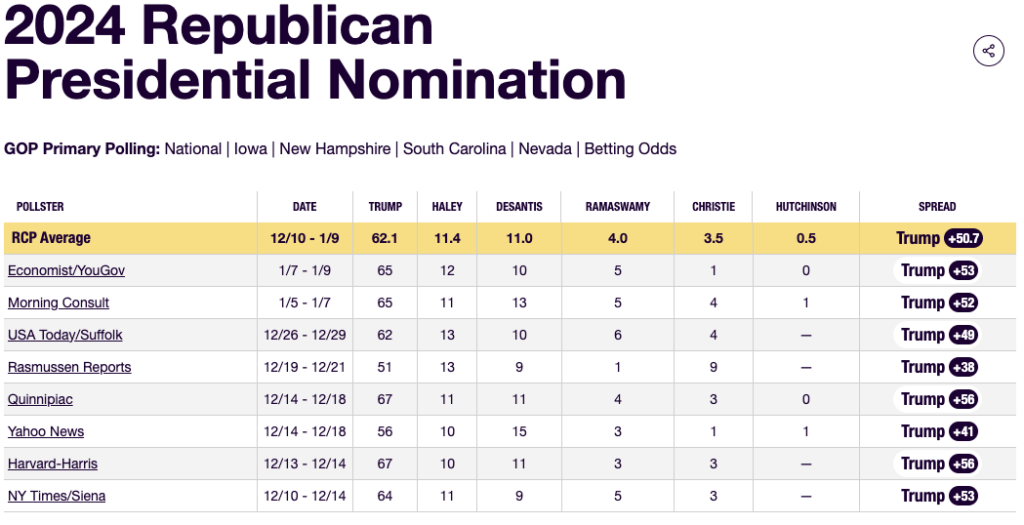
Trump is averaging a 51.2% lead over Haley, his nearest challenger. Even if she picked up all of Christie’s 3.3%, it doesn’t matter.
Here’s Iowa:
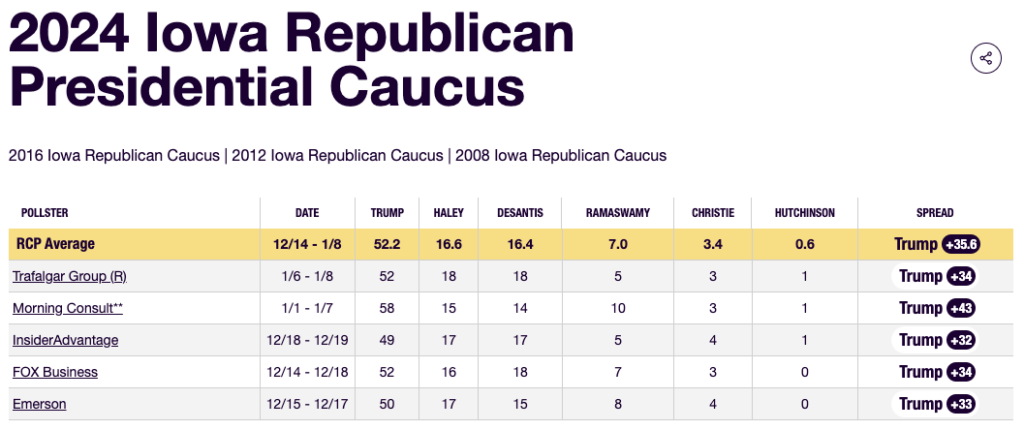
It’s considerably closer—but not close.
Really, all Christie dropping out does—at best—is make Haley a slightly more clear distant second-place finisher.
In 2016, many pundits and activists called on the non-crazies to rally around a single candidate in order to beat Trump. That has essentially happened this time, with only Asa Hutchinson still inexplicably running for the normie vote that Haley is courting.
Indeed, we have the reverse 2016 this time around: Trump is competing against two other MAGA candidates in Ron DeSantis and Vivek Ramaswamy. He’s nonetheless wiping the floor with the field.

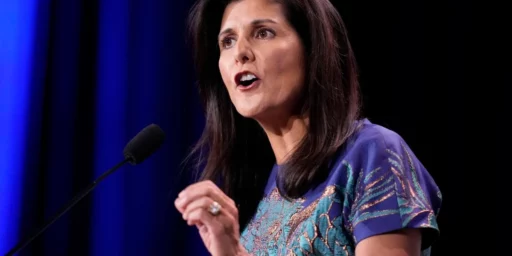

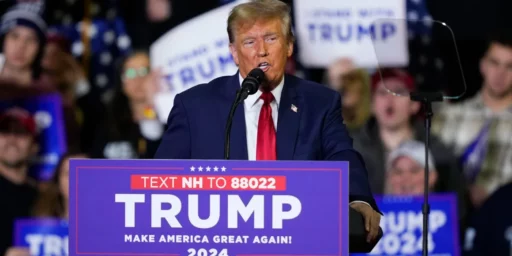

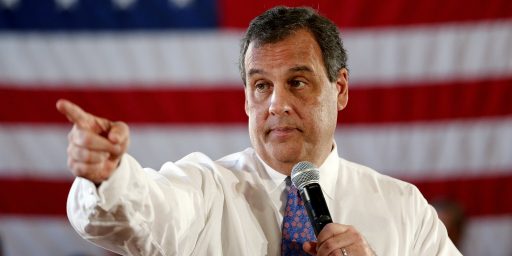
One blessing in all this is that I no longer see the pundits wailing for a “normal” Republican to go against Trump, that there is a base of GOP voters who were forced to vote for him against their wishes because of evil Hillary Clinton/Joe Biden.
Trump IS the Republican Party. He embodies it perfectly. If he were to drop dead tomorrow the GOP Base would find another vile freak to take his place.
Indeed, we have the reverse 2016 this time around: Trump is competing against two other MAGA candidates in Ron DeSantis and Vivek Ramaswamy. He’s nonetheless wiping the floor with the field.
Trump’s base of support is strong enough in the party that he basically has no way of losing short of outright denouncing violence and white supremacy. He could drop 1/3 of his supporters (and go nationally from 25% to under 20%) and still be in the lead.
I don’t understand what DeSantis gets out of this except the VP spot. Vivek’s campaign is capped around 10%, but it’s an effort at name recognition and future returns.
2 things, 1st: Christie had zero shot at the nomination and was indeed siphoning off “normal” Republican votes from Haley, assumes facts not in evidence.
2ndly, how can one end something that never really existed?
“Attack dog”?
When did CC ever live up to this billing in going after Trump – actually doing it, rather than just telling reporters he was gonna do it, any minute now, you guys just watch, knee straight to Trump’s balls, he’ll never know what hit him, hoo boy any minute now, are you guys watching? gonna be a chiv straight to the heart, we’re tough in NJ, did I ever tell you how I went after Jared’s father? etc. etc. etc.
And what did he deliver? Nothing. Nada. Crickets soundtrack played in the background.
All CC wanted was the press to associate him with something other than that photo of him standing behind Trump and staring into the middle distance like he was a hostage. Go after Trump, my a**. He got played by Trump just like all the other GOP and he doesn’t get to walk away from it now.
There was never a path for him to win the nomination, so what the flock is he even talking about?
I don’t think there has ever been such a profound example of the weakness of our National political parties as last night. Not only did Christie drop out but the presumptive front-runner skipped the national debate and held counter-programming on the largest Right Wing new network. Additionally both candidates at the debate both more or less admitted that they would support Trump if we wins the nomination.
This is the ultimate win of the base over the National Party.
The way to attack the Orange Ass, as regards winning the base, would be to accuse him of being weak, stupid, chaotic, and incompetent, all of which is true, and to point out this makes him incapable of really taking charge and implementing all the oppression, repression, and revenge the base is clamoring for.
Before the campaigns started, DeSatanis looked like the most likely to do this. He hasn’t only been incapable of attacking the Ass, but also has proven a mediocre campaigner at best (one wonders how he won two terms in Florida).
@Kathy:
I honestly don’t think that approach works. Essentially the base has already inoculated itself to that reality. Additionally, the majority of their elected officials are unwilling to back up those claims.
People forget how close he came to losing the first race. Then add in demographic shifts (and the fact that Florida is now a Republican state) and an unpopular opponent and you get the second election.
@Kathy:
I think you are on the right track here, although I might phrase it differently. If you want to take the nomination away from Trump, a candidate would have to
1) Accept that Trump is the model for the GOP base – they want that kind of candidate and there is no point in offering them a significantly different one
2) Figure out your “interpretation” of the Trump archetype. How do you present yourself as Trump but in a newer and fresher way. You can’t out-Trump Trump, you have to be the new and different outrageous thing.
3) Praise Trump’s astounding successes in the past but paint him as someone who’s lost his edge, who’s let himself get embroiled in drama. Essentially as the college football coach we love but who hasn’t won lately and has become enmeshed in drama, and maybe it’s time to give them a nice celebratory dinner and put them out to pasture.
4) Portray Trump as unjustly besieged from all sides and eventually succumbed, letting himself get mired in the tit-for-tat drama. Four more years of Trump will just be four more years of complaining about the 2020 election and that Congress didn’t build his wall and re-litigation of every one of his almost successes. Turn “He never stops fighting” into “He can’t seem to get past the past anymore.”
5) Whisper into a reporter’s ear, “Don’t you think he looks tired?”
Alternatively, you could just wait until Trump dies or fades away. All the candidates opposing him didn’t have the cojones or skills to pull off the first method, so we are left with all the “smart” Repubs biding their time.
In national head-to-head polls Biden and Trump are tied at 41%. Of course what really matters is the swing states, but I don’t think we can entirely discount the main horse race polls on the theory that it’s all Californians. The CA cohort is equalled by the Texas + Florida side.
So, let’s pretend to take these numbers at face value. A former POTUS and a current one are tied. The current president is, inevitably given that Americans ain’t too bright, blamed for everything from gas prices to plastic grocery bags. But Joe Biden, has actually topped 50% (51.3%) while Trump’s best number was 46.8. He was elected with 46.1. During four years in office Trump gained essentially nothing and was beaten soundly, despite the advantages of incumbency.
IOW, Biden has a potential for growth that Trump appears not to have. And that’s before the Biden campaign even begins, while Trump is everywhere, all at once. He talks and talks and posts and posts and rants and rants and stays stuck at ~40%.
Two other things. One, the economy is actually great, people are spending like the economy is great, but there’s a gloom and doom feeling hanging over everything. But reality tends eventually to assert itself. And thing Two: abortion.
I don’t think Christie was ever the attack dog he was in his own imagination, but he landed some blows. The multiple prosecutions are also landing. And Trump’s rapid mental decline is getting to the point where even the MAGAts have to notice. The man babbles utter nonsense, and not even internally consistent nonsense, or nonsense that’s on-point. He’s senile. A mind filled with nothing but fear and rage is not one best-suited to slide gracefully into mental decline. And he was stupid to start with.
We cannot be lazy or take anything for granted. But we should knock off the gloom and doom and start talking like Democrats: about how to build a better future. Americans will go through down periods, but we are by nature an optimistic people. Hope is our best ally.
I think you are missing the importance of this by focusing in on Iowa. If every Christie voter in New Hampshire swings en masse to Haley, she’ll likely lose in the mid-single digits instead of low-double digits. Then with that momentum she’ll be really well positioned to lose South Carolina by only 15% or so instead of 25%+. After that it’s on to Connecticut where she’ll likely keep Trump’s win to under 75%. And after that? Well, then it’s a whole new ballgame.
@Matt Bernius:
I’ve never quite understood the notion popular around OTC that the mythic “National Party” is necessarily more legitimate than its rank-and-file.
Why shouldn’t the voters who comprise a party define its priorities and control its destiny? Can someone explain exactly why a wealthy and elite minority failing to have its way = “the party” is weak? Do not the voters and small donors have an equal or better claim that they are “the party,” since they have the numbers and the power?
Questions and questions.
@Michael Reynolds: Here, here. One of the reasons I could never be a modern Republican is that for a couple of generations now they have been defeatists. Rather than embrace the hard problems and solve them, they carp and whine and then angrily stamp their foot and proclaim there is no problem. Losers, the bunch of ’em.
@DK:
I’ll turn that around: Why should they?
If there was a party whose core principle was, say, the environment, and a bunch of people registered in that party, do they have the right to take “The American Eco Party”, dump the eco and instead make it the anti-abortion party? Or should the leaders hold fast to the principles of the party and tell the agitators to go join an actual anti-abortion party.
I can see arguments for both sides.
And of course Stephen often points out that even when we try to let the membership decide, the reality is that the franchise is effectively limited to the small percentage with the time, money and inclination to make themselves heard.
@Neil Hudelson:
I think Haley could end up even closer than that to Trump. Democratic-leaning independents have no reason to pull a Democratic ballot this year, and can vote in either party primary. How they choose to vote depends on if they are bent on embarrassing Trump or vote for him, thinking (IMHO, erroneously) that he’s easier to beat in the general.
As a NH voter, I am very interested in seeing how this all shakes out in two weeks.
@Michael Reynolds:
Who is “we” here?
Cue Michael Jackson:
I’m starting with the man in the mirror
I’m asking him to change his ways
Whenever some of us have said, repeatedly, that all the doom, gloom, negativity and ‘Democrats are losing everything, everything, all at once’ is unhelpful, untrue, uninspiring, and likely to help depress the turnout of anti-Trump voters…
…”we’ve” been told that “we” were ignoring reality and were making heretics of the bold dooming-and-glooming truth tellers.
I guess we are all pollyannas now. Thank goodness!
@MarkedMan:
I would agree but I think it is likely that it wouldn’t necessarily be the same person. Like When the Grateful Dead stopped touring and their fans were in the wilderness looking for a band to follow. They ether stopped following a band or they adapted a new band, but not the same band.
If Trump keeled over from a heart attack I would be astonished that his followers would gravitate to the same person. I also think a significant minority of that group would go back to not caring about politics.
@MarkedMan:
Because they can.
In fact, party platforms and coalitions often do change. If a party’s voters want to change what the party stands for, and have the power and means to do so, then that’s all the right they need.
There’s no rule making a rich minority automatically “the leaders” of the party and everyone else “agitators.” Just sounds standard issue elitism to me: the privileged do not like having their power usurped by those they consider inferior.
Genteel country clubbers (and McCain Democrats in recovery like me) may not like that Trump has empowered the incels, QAnoners, and trailer trash deplorables, but that doesn’t necessarily mean “the party” is weak. It just means that within the Republican Party, the country clubbers and folks like me are/were weak. Trumpers have just as much claim to “the party” as the Bushes and Romneys, maybe even more so.
The reality is that outcomes are dictated by doers.
The keyword here is not time or money, it’s inclination. If we don’t care to help make decisions, then others will decide. If we’re not inclined to get involved, by definition we lack input relative to others. Non-response is a response.
So again, why should an elite, rich minority lacking numbers and power get to control a political party? Just because, “We’re your betters and we say so?” They can try this, but no one has to acquiese.
@Rick DeMent:
Good insight. I suspect you are right
@MarkedMan: I appreciate that fifth comment, fellow Doctor Who fan.
@DK:
The power and means to do are written into the bylaws of the party though. It used to be the norm in parties that only people that had demonstrated a commitment to the party beyond simply registering as a member had a say in who they picked. That’s still true in many of the smaller parties. I don’t see anything wrong with that.
@DK:
Because the voters in the primary come from the base.
My opinion of primaries was completely changed by witnessing what happened to Ross Perot’s Reform Party after he was no longer their candidate (2000?). The bylaws were set up with much ballyhoo and self-congratulation in such a way as to allow every registered member to have an equal say in who would be the nominee. No smoke filled rooms, no elites, just the wisdom of the common folk.
What actually happened was that professional campaign managers noticed that there was significant treasury just waiting to be raided. All they had to do was back a willing candidate and ensure they he got the nomination. It ended up being Pat Buchanan but it could have been anyone willing to pick the professional campaign consultants as their strategists. They quickly burned through the entire treasury and matching funds, got Buchanan 0.4% of the national vote and then walked away with their pockets stuffed.
Up until that point, I think I was of the anti-smoke filled rooms persuasion. I’m still not a fan, but I also realize how futile it is to have a party that stands for anything if its entire future and cohesiveness is dependent on the whim of voters, the vast majority of whom know nothing about the party’s founding principles, the candidates or the dynamics of the election.
Now that I think about it, I would say that there is no good way to nominate a candidate, if by good you mean a system a party puts in place to ensure that an honest, high quality candidate who endorses the bulk of the party platform emerges. No system seems to work better or worse than any other, over the long term.
@DK:
I don’t think that one option is necessarily better than the other. I think an optimal system would have some form of balance between the two.
In my mind, the core issue is that our present system isn’t a situation where “the voters who comprise a party define its priorities and control its destiny.” Beyond the fact that primaries represent a minority of a minority of a party, they are skewed by things like gerrymandering of districts. Further, there is the issue of the scheduling of said primaries, which further skews things by saying a minority of a minority of voters in certain states will have significant power over the selection process.
The result is that we have an undemocratic system of voting within each of the parties that ultimately controls the nomination process. Add in the type of ideological sorting that happens under a two-party system (including the tendency to move towards the margins) and we end up with our current situation.
Then add in the ability of a national party to have the necessary controls to reign in the extremes and it sets us up for the situation that we see the Republican party in. Which wouldn’t be as worrisome if our overall presidential electoral system wasn’t so undemocratic in its construction.
The tl;dr: I’m not advocating for elite control. And I think it’s also worth noting that our current system really isn’t democratic even if, on its face, it seems like its being driven by the will of the voters.
@DK:
On the one hand this is correct. On the other hand, this can easily be reduced into a “might makes right”–especially in systems that are optimized for democratic results. To me, this comes across as an argument against working to change the status quo.
For example, one can look at the entire electoral college system and say “why does it matter that we have a system that is biased against one of our parties? If they really want to win, they just have to work harder.”
@Matt Bernius: First, a caveat. In this whole discussion I am more thinking out loud rather than arguing for a point.
I get what you are saying here, but I’m on DK’s side: in the end the people who show up for the often tedious meetings, do the work, sit on the committees, learn about the issues, negotiate amongst interested parties, etc, are going to have much more of an impact than someone who shows up once every four years to vote in a Presidential primary. And I think that’s right – that’s the way it should be.
@DK:
You’re too intelligent to be this dumb. Optimism and hope does not mean, “everything we do is right and we need no strategy.”
Maybe spend less time trying to one-up me, and more time learning about politics as a game, as a battle, as something more than virtue signaling.
Parties have very little power; I worked at a state GOP party and the only real function was raising money. We provided some help with things like voter lists, and some precinct analysis, but mostly it was finding donors, raising funds, and distributing those funds. Candidate recruitment was usually handled by the state-level House and Senate party committees. We didn’t ever get involved in primaries that I recall.
People seem to think there’s a lot more to it, but there really isn’t, at least not from my experience (which is admittedly decades old).
National Democrats should and must set the agenda because a fractured party cannot outplay a unified national party, like the GOP.
Local parties absent any top-down agenda discipline could adopt policies that work at the local level but are non-starters at the national level. Media are national, now. What gets people hot in SF or Salt Lake City may be poison nationally, which would give us the old ‘Dems in disarray’ headlines. Of course the reverse is true as well, which is why national Democrats look for ways to square the circle, adopt coherent (usually mushy) policies that don’t make it impossible for either SF or SLC to stay inside the tent.
Support for the Civil Rights movement was a top-down decision, and it broke the party, leading to the Dixiecrat exit and subsequent GOP take-over of the South. It was also absolutely the right stand and created the modern Democratic coalition. Had the Dems devolved more control to the local/state parties, would the party have supported Civil Rights? Eventually, probably, but not in 1948.
@Matt Bernius:
What’s undemocratic about the candidate that gets a majority or plurality of primary support winning the nomination? Genuine question. Democracy isn’t “everybody is happy with the outcome.” It’s everybody gets a more or less fair chance to compete.
If my minority competes against two other minorities in a primary — and others choose not to participate at all — and my minority gets the most votes and delegates, that doesn’t make that system undemocratic. We all got an opportunity to compete. Some chose to compete, some chose not to. And one faction was more persuasive and successful in the competition. What’s wrong here? That’s not an affront to democracy, that’s how democracy works.
The smoke-filled room model where one elite group imposes its will without competition is an affront to democracy.
@Michael Reynolds: Except I’ve never said “Everything we do is right.” But we can always count on you to argue against your own dumb, lazy lies.
What I actually said is pushing doom, gloom, negativity, and the false claim that Democrats are losing everything everywhere is unhelpful to our goal of inspiring voters.
But, of course, when dishonest people can’t refute the actual point being made they just make stuff up. It’s an old story.
@Matt Bernius:
Really? Hmmm. I think it’s a pretty clear-cut call for action. If we want change, we have do something besides talk about it.
For example, yes, it absolutely matters that the electoral college is one of the undemocratic elements of our system. Noted. Now what?
After we recognize a problem, change requires some kind of action, no? Democrats having to work harder to overcome, or change, the electoral college is just a matter of fact.
@MarkedMan:
I agree. I mean, the far right worked hard to take over the Republican Party, starting with the Tea Party. They got involved, and they won the war of ideas. Other minorities and factions on the right have the opportunity to persuade. It’s not necessarily an undemocratic system or a weak party because the conservative normies are failing to convince enough people. They have to step up (and are doing so, albeit belatedly and still too tentatively).
I think sometimes we say, “This is undemocratic” when what we mean is “Democracy is hard.”
@MarkedMan:
Again, I don’t think that the idea that “the people who show up are the people who lead” is wrong on its face.
However, I also think we need to look at the overall system and evaluate how it creates those opportunities to show up and lead. For example, how accessible are things for people to participate? What are structures in place to help avoid a “loudacracy” or prevent the most extreme members of a community from taking control.
There will always be friction in processes, but as Steven and others have been writing about for years our systems are simply not optimized for democracy (and I say that as someone whose work has bridged more and more into community organizing).
@DK:
That is one solution. Another is to turn it’s asymmetry to their own advantage. The Republican Party is the party of the Old South and has remade itself in that image. It is not automatic that Midwesterners and the Mountain states have to see themselves as racist busybodies intent on setting almost everyone against this or that small group. In fact, I think a concerted effort of listening to people’s concerns, seeing where they overlap with Democratic Party values, and aligning Democratic goals with theirs, where possible, could turn that disadvantage into an advantage.
@Matt Bernius: This sounds good, but I’m not sure what it means in terms of concrete action. What changes do you actually propose? Are they changes the Dems and Repubs and perhaps other parties should make or are they something imposed from outside?
@DK:
Because US primaries are structured in an undemocratic way.
There are democratic trappings, but the timing of primaries, the limited polling spaces, not to mention that different states go at different times all combine to a system where a minority of a party is deciding who will be the nominee.
Heck, see what’s happening in the Democratic party and the attempt to rework their primary schedule is a good example of this. That process also demonstrates the need for a strong party to try and enact change to the process.
I suspect that historians will look back 100 years from now and decide that the Covid pandemic managed to break something in Americans’ minds.
At some point the U.S. will have to come to grips with the fact that a lot of its inhabitants don’t want to have to deal with reality and will scamper off following any demagogue who will promise them whatever they want. Consumerism may be great for the economy but it’s lousy when dealing with reality. Vaccines DON’T cause autism, there WERE landings on the Moon, the Earth is NOT flat, and global warming IS real.
@MarkedMan:
It’s worth noting that this type of work requires a strong and active central party to lead that work. It also requires districts that would make it easier for the theoretically more centrist candidates that emerge from that work to win the primaries.
@MarkedMan:
I think a lot of these have already been suggested in other places. For example, working towards a primary schedule that enables states with populations the most representative of the country (or perhaps the party) to go first. I think some of this gets into looking at tools other than first past the post. Also, avoid splitting presidential primaries from state primaries. Consistent early voting rules.
Steven is probably the better person to ask about specific measures.
BTW, I need to admit that, as with commenting on legal issues, I am outside of my expertise wheel house on some of these things. So I’m enjoying the conversation and learning from it. And things I said could definitely be wrong.
@DK: And sometimes we say “this is undemocratic” because we’re not going to get what we want from the change/status quo. And our current situation is leading to, contrary to the Rolling Stones adage, we aren’t even likely to get what we need anymore. I don’t know what to do to fix it, but will note that elite groups imposing their will may be undemocratic, but also represents the dominant historical model over the previous 5000 or so years. I’m open to arguments either way but am leaning toward the US having a surfeit of democracy at the moment. If our national history regarding competency tests, poll taxes, and such wasn’t so jaundiced, I might lean that way. On the other hand, conservatives lean the way of demonstrations of civic competency, and my conviction remains that I left supporting conservatism because at this juncture of history, conservatives are wrong about almost everything. So there you go. Another idea rendered useless by intersection with humans.
@Grumpy realist: Except that COVID is a symptom of the breakage rather than the catalyst of it.
@Just nutha ignint cracker:
I think it was a catalyst, or an accelerant. The trend was going that way, after all, Lardass wasn’t elected in 2020. But you can see it in public figures like Xlon. He was an egotistical prick before the pandemic, and he was trending towards ditching all limitations and overextending himself*, but post COVID he just went full on white supremacist conspiracy nut, albeit selectively (apparently he still believes in climate change, but it’s no longer that important).
*remember the magical mystery sub he proposed for rescuing the teens trapped in a cave due to flooding? And the fight he picked up with a spelunker (apologies if this isn’t the right term)?
It’s darkly humorous reading the desperate attempts by journalists to explain that Haley “still has a path to the nomination”. But not DeSantis, for some reason, even though they’re virtually tied in the polls.
This is a weird primary, which has really been a contest to determine who has the best argument to be the late emergency nominee should Trump die or be imprisoned after the convention but
before the election. But naturally none of the candidates can say so.
Anyway Christie looks to have landed on his feet, being talked about as the No Labels candidate. So is Larry Hogan, who has stepped down as its co-chair. Maybe they’re going to field a Hogan/Christie ticket next year, because nothing says “bipartisan moderates” like two ex-Republican governors.
@Matt Bernius:
I should like to hear from Dr. Taylor, his defenition of “weak” in this context, and “weak party.” It’s his wheelhouse of expertise, he’s probably already defined this somewhere, but I can’t find it.
I wouldn’t take it for granted that we are all speaking of the same thing when we say a party or party structure is “weak” or “strong.” Is it the case that a “strong” party is less democratic than a so-called weak one, and is that really desirable? What are the potential pros and cons?
Maybe weak parties are a feature, not a bug, of our federal and republican democracratic system, given that some of those who crafted our system were famously hostile to partisanship and factionalism. Perhaps we are supposed to find Americanism frustrating.
@Matt Bernius: I appreciate the answer but my wuestion wasn’t about making itveasier to vote in primaries but rather this statement:
in all kinds of groups, political, social, or corporate, this is a tough problem. I don’t know how much it can be solved by implementing a different system.
@Ben:
Unlimited rice pudding for everyone!